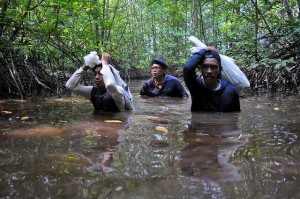By Amy Cruz, originally posted at Agroforestry World Blog, related to the CGIAR Research Program on Forests, Trees and Agroforestry
Natural ecosystems are set to change dramatically in Asia and humans will not escape the consequences, warns Rodel D. Lasco of the Intergovernmental Panel on Climate Change

‘Practically every spot on the Earth has warmed,’ said Dr Rodel Lasco, World Agroforestry Centre Philippines country coordinator, presenting the key findings on climate change in Asia from the fifth Assessment Report of the Intergovernmental Panel on Climate Change (IPCC) at the 2015 Green Seminar Series—‘Finding solutions towards climate-resilient communities’—at the University of the Philippines Los Baños Climate Risk Studies Center and School of Environmental Science and Management, 18 March 2015.
‘Clearly, climate change does not only affect natural ecosystems but also the lives of people’, he pointed out. Dr Lasco is the lead author of the Asia chapter of the IPCC’s Working Group 2 , which looks at the impacts of, and adaptation and vulnerability to, climate change. He emphasised that there is a consensus among scientists that global temperatures are increasing and rainfall patterns and amounts will be hard to predict.
‘This translates into uncertainty regarding future freshwater availability in most parts of Asia’, he said. ‘This will be exacerbated by the lack of good management and increase in water demand owing to population growth and higher standards of living. This is likely to worsen water scarcity throughout the region’.
The uncertainty extends to predictions regarding tropical cyclones, the frequency of which might actually decrease or perhaps remain unchanged. However, Dr Lasco noted that it’s likely that those cyclones that do occur will show an increase in maximum wind speed and rainfall, meaning greater likelihood of ‘super storms’.
Furthermore, coastal communities will probably experience severe impact from the rising sea-levels in the Asian Arctic, which, combined with changes in permafrost and longer lengths of ice-free seasons, will cause greater erosion of beachside land while coastal freshwater swamps and marshes will suffer from saltwater intrusion. Low-lying coastal rice fields, too, are in danger, especially those in the Mekong Delta, where nearly a third of productive land is slated to be salt-affected. Farmers there are already seeing their fields becoming unusable except as fish farms.
Out at sea, ocean acidification and warming will increase damage to coral reefs while warm-water species might move towards more temperate areas and marine biodiversity generally in the tropics may decrease if temperatures exceed tolerable limits. This will likely cause strains on seafood supplies to increasing populations.

Back on land, shifts in the reproductive cycles, growth rates and distribution of plant and animal species have already been observed. Projections show boreal trees invading the treeless arctic, however, the impact of climate change on the vegetation of the lowland tropics is still poorly understood and hence planning for more adaptive food-crop species in particular biophysical zones is limited, with potentially dire consequences for humans.
‘Declines in agricultural productivity owing to climate change will mean greater food insecurity for the growing population’, Dr Lasco said.
Most models show higher temperatures leading to shorter growing periods and lower rice yields although losses because of heat stress may be offset in part with carbon-dioxide fertilization enhancing plant growth of rice and other crops.
Read full blog at Agroforestry World Blog











